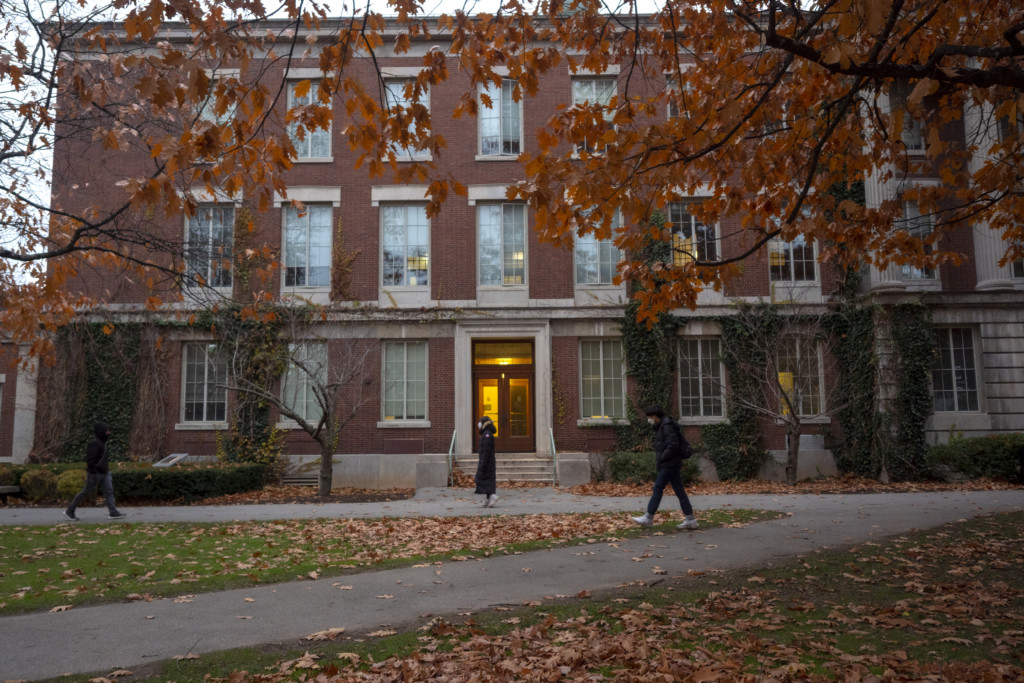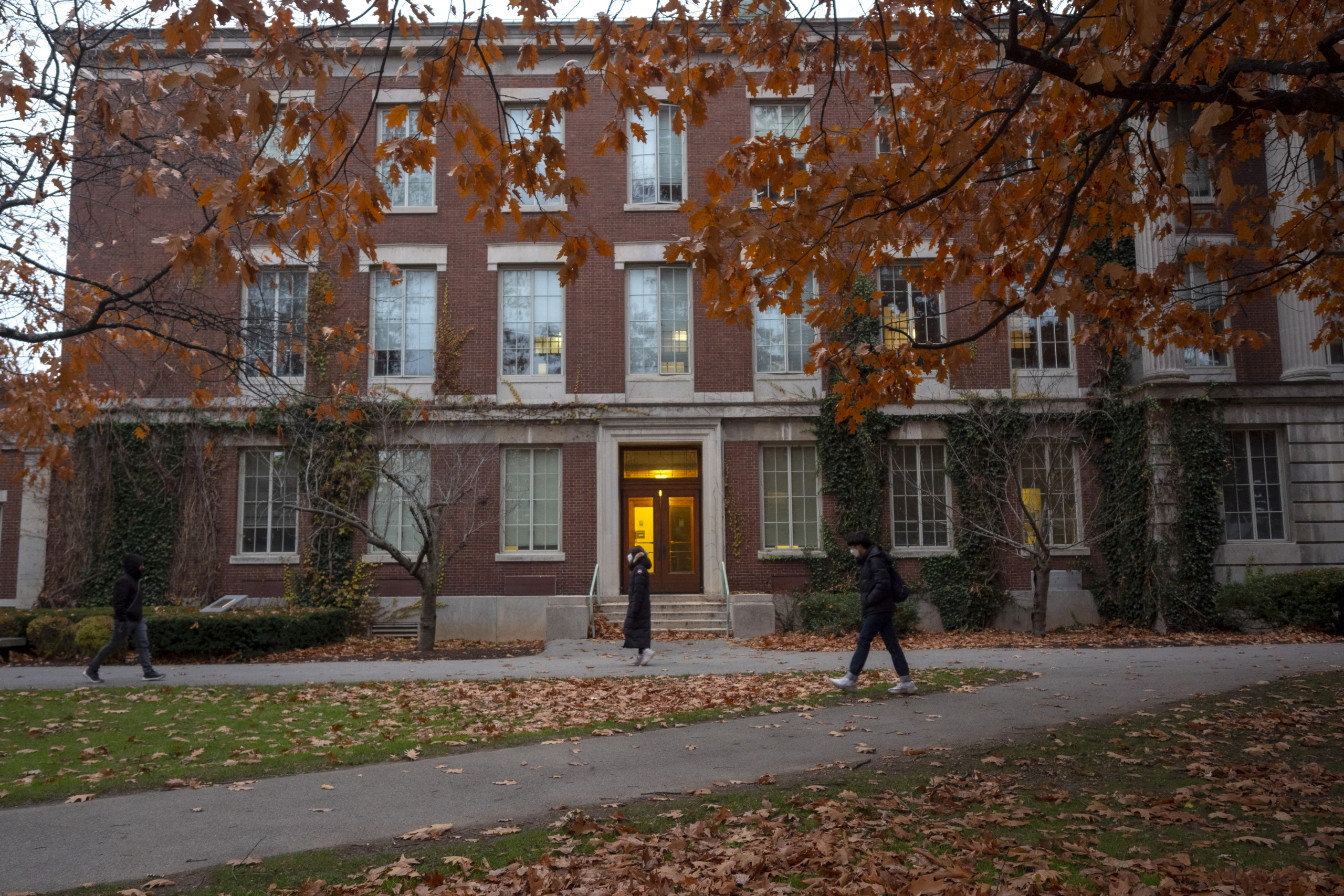On Sept. 21, white English professor David Bleich read aloud an article containing multiple instances of the n-word in front of his class.
Junior Arianna Taylor, who self-identifies as Black, recalled feeling incredibly uncomfortable. “I personally felt triggered,” she said. “I was also angry. I was a little bit shocked. I thought about walking out of the class, but I also felt like I kind of needed to see what else he was going to say.”
Taylor recounted that in the first few classes of the semester, Bleich prefaced that the course was going to discuss race, read works from African-American authors, and come across texts that included the n-word. He then asked the class their thoughts on saying the word as it appears in readings.
“The class was kind of just collectively like, ‘No, that’s very inappropriate, it’s hurtful,’” Taylor recalled. “He made basically a little bit of an argument about it, saying ‘Oh, it’s for pedagogical understanding, and we’re scholars,’ but these words still hurt people […] They’re still slurs. We shouldn’t use them.”
She recalled Bleich saying that he would respect the general opinion of the class, and assumed he wouldn’t bring it up again. A few weeks later, Bleich sent out a supplemental reading in favor of saying the n-word in academic contexts, written by Harvard Law Professor Randall Kennedy.
When students next met for class on Tuesday, Sept. 21, Bleich asked if they had looked at the supplemental reading. She had read the piece and recalled that some other students had as well. Taylor said she then expected a comment on the paper or a short discussion at most.
“But then he pulled out printed sheets and just started reading,” she said. “And then he was just going and just reading the n-word — like just hard ‘r’, back to back to back.”
After his reading, during which Taylor speculates he said the n-word around 10 times, some students expressed anger at his choice to do something the class had already condemned. After class, Taylor filed a bias-related incident report and dropped the course.
Upon submission of the bias report, Bleich was removed from the classroom within a week. Classes on Tuesday, Sept. 28 and Thursday, Sept. 30 were canceled. On Tuesday, Oct. 5, they resumed under the instruction of Dominique Townsend, a Ph.D. student in the English department. Taylor rejoined the class for their Oct. 5 session upon hearing that Bleich would no longer be teaching the course.
On Nov. 15, the Academic Freedom Alliance (AFA) penned a letter to Dean of the School of Arts and Sciences Gloria Culver decrying Bleich’s suspension.
“I write on behalf of the [AFA] to express our firm view that these disciplinary actions directed toward Professor Bleich are an egregious violation of his academic freedom,” Chair of the AFA’s Academic Committee Keith Whittington writes. “This interpretation and application of the university’s harassment policy would conflict with longstanding principles of academic freedom embraced by American universities, and it would be in breach of [UR’s] own stated commitment to academic freedom.”
The letter goes on to discuss the policy laid out in UR’s Faculty Handbook, stating that “[t]here is no question that this classroom discussion fell within the bounds of this provision.”
AFA is a national “alliance of college and university faculty members who are dedicated to upholding the principle of academic freedom […] [Their] members from across the political spectrum recognize that an attack on academic freedom anywhere is an attack on academic freedom everywhere,” according to their about page.
Culver has not publicly replied to the letter and said she was unable to comment on the incident in the classroom, citing confidentiality and an ongoing investigation.
“[T]he University and the deans in AS&E are firmly committed to the principle of academic freedom,” she said. “This commitment is outlined in the University’s Faculty Handbook. We are equally committed to the principal pedagogic value — also reflected in the Faculty Handbook — of respecting the opinions and contributions of others, which is essential to a successful learning environment.”
Taylor expressed concern about facing retaliation for publicly speaking about her role in the incident.
“Not necessarily from the student body, but more so from faculty if I’m applying for opportunities,” she said. “But I understand that if anybody who’s impacting my future is going to go against me for coming on record for this, then they’re not an organization that I need to be working with because they don’t support me […] The main reason why I came on record is because this is still happening. It happened to me. And students really need to know about this. Especially students of color, Black people, they need to understand, ‘Hey, this is still happening. Speak out if and when you can, if and when it’s productive for you, understand that you’re not alone.’”
When asked for comment, Bleich said the following in an email to the Campus Times: “The university is a school. That means that those of us in classrooms should feel free to read and speak about issues that are affecting society. Silencing teachers and honoring all discomforts of students will not contribute to the ending of racism in the United States. Such actions exacerbate racism and public fear. I am grateful for the outpouring of support I have received. I hope the University of Rochester will decide to take a productive path toward the study and understanding of how the uses of language may be a path [t]o ending violence rather than a pretext for recrimination.”
Unrelated to this incident, the University announced in the Dec. 2 @Rochester email that it has concluded its year-long review process and “substantially revised” the Policy Against Discrimination and Harassment (PADH), making changes that will go into effect on Jan. 1. Notable changes include developing a panel to “determine responsibility for alleged violations” instead of a single person and increasing the protections for students to bring them to the level of employee protection.
“Members of the University community are encouraged to report discrimination and harassment based on a protected class as well as retaliation based on a prior complaint of discrimination or harassment,” the @Rochester email read. “Members of the University community who feel that they have experienced behavior that violates the policy, as well as those who witness or become aware of concerning conduct, should file a report using the online PADH report form.”



